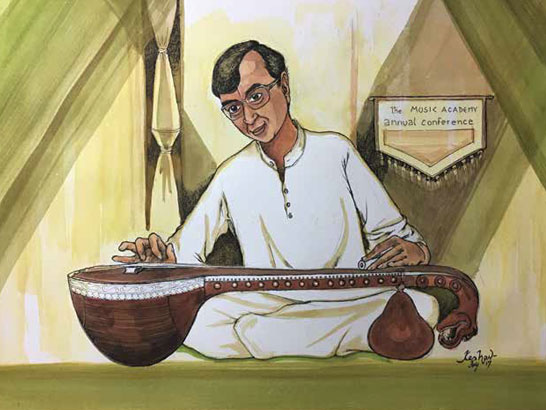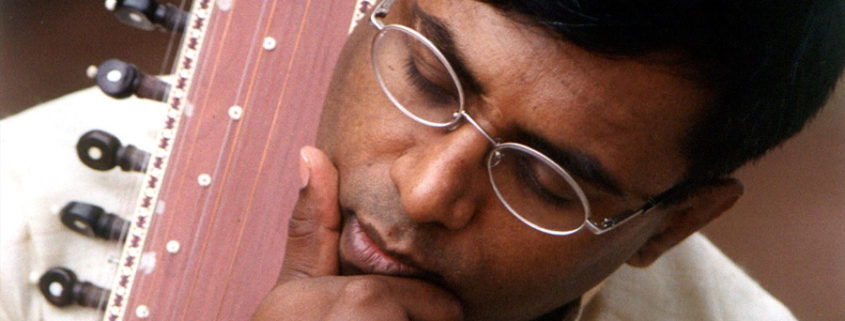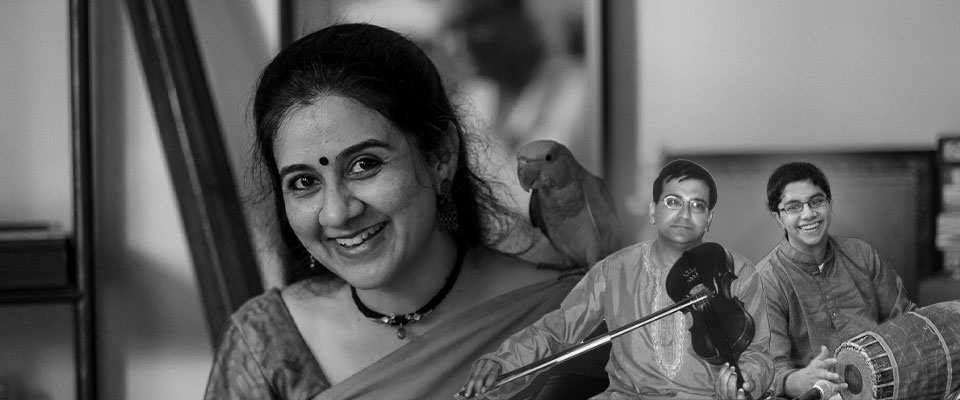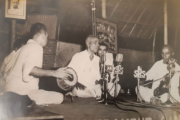Ravikiran is among the more prolific composers in Indian Music with over 800 compositions to his credit. About half of these are traditional classical pieces which include about 400 krtis, 30 varnams, 35 tillans besides javalis, padams, pushpanjalis, kavittuvams, shabdam, bhajans, chindus etc. Several of Ravikiran’s works have been presented by leading musicians and dancers.
The rest are diverse creations for operatic productions, Western Classical symphonies, Jazz / Rock / World music ensembles and an occasional background score for TV show or documentary films.
- First raga discovered: Choodamani, when he was two years old and named after his mother.
- First full composition: Karunai kondu in Samapriya when he was 12.
- Languages: Sanskrit, Tamil, Telugu, Hindi and Kannada.
- Ragas discovered: Ragas in honour of Beethoven (Veetavanam) and Mahatama Gandhi (Mohini) besides Keshavapriya, Mohini, Snehapriya, Katyayani, Sanjeevini, Shivamanohari, Shivanandini, Nityamangala and Andhakarini.
Unique works
- Songs in each of the 35 talas of Carnatic music.
- 72-mela ragamalika geetam, a unique formula-piece appropriate for both practice and performance.
- A whole piece with only descending phrases in Carnatic music (Sada nin padame – Chakravakam).
- Krama-swaraksharas that use the entire ascending/descending notes of ragas like Saraga pada sarasa (Mohanam), Sada makhari (Abhogi) and Sada pamari samooha (Vandanadharini).
- Schematic swarakshara songs which showcase combinations of swaraksharas centered on specific notes. Examples: Sada sadayudai (Hindolam) which highlights the notes Da and Ma with words like Sadaa, Gadaa, Madaa and Samaa, Gamaa, Damaa etc, Saadaramutonu (Shankarabharanam – which uses Saada, Rida, Gaada, Maada etc), Sarigadamma (Keeravani with Sari, Riri, Gari, Mari, Pari etc).
- Pancha-raga-tala-jati-malika tillana (showcasing 5 talas and jatis in 5 ragas), Dasha-Ranjani Tillana (covering 10 ragas whose names include ‘ranjani’ like Shreeranjani, Shrutiranjani, Manoranjani), Raga-bhasha-malika krtis (each section of the composition is in a different language), Natya-malika tillana, (where the 3 sections of the piece can be portrayed as bharatanatyam, kathak and kuchipudi with the final one merging all three).
- Eulogies on Buddha, Vyasa, Adi Shankara, Ramanuja, Tyagaraja, Carnatic Music Trinity, Ramana Maharshi, Swami Vivekananda, Kanchi Paramacharya, Sitar maestro Ravi Shankar, M S Subbulakshmi besides his Guru Chitravina Narasimhan and his close friend and late contemporary, Mandolin U Shrinivas.
- Created the form, swarakrti – compositions featuring only sol-fa passages but with defined structure similar to krti.
- Shiruppuhazhs: Meter-based creations inspired by the Tiruppuhazhs of Arunagirinathar.
- Wedding songs: These include Lakshmi kalyana vaibhavam (Manirangu), Kolahalame (Kolahalam), Namamyaham (Vivahapriya), Tirumaname (Saraswati & Narayani), Kalyaname vaibhogame (Ragamalika), to name a few.
- Wellness and Health songs: Anjaneya palayashumam in Sahana, Tryambakam yajamahe, inspired by the Mrtyunjaya Mantra in Deepakam, Devi paratpari (Lalita) etc.
- Secular songs including Unmai unarndor (Ragamalika), Sandippavar vandippadum mayam (Huseni), Kalvi karpom (Kapi).
 Ragas employed: Ravikiran has composed in several hundred ragas including grand ghana ragas like Shankarabharanam, Kalyan and Todi, evocative rakti ragas like Yadukulakambhodhi, Sahana, Dhanyasi, Surati and Devagandhari and also in ragas such as Ranjani, Kadanakutoohalam, Bindumalini and Sindhubhairavi.
Ragas employed: Ravikiran has composed in several hundred ragas including grand ghana ragas like Shankarabharanam, Kalyan and Todi, evocative rakti ragas like Yadukulakambhodhi, Sahana, Dhanyasi, Surati and Devagandhari and also in ragas such as Ranjani, Kadanakutoohalam, Bindumalini and Sindhubhairavi.
Talas: Ravikiran’s compositions use a wide variety of talas including popular ones like Adi, Roopakam, Mishra Chapu and Khanda Chapu besides relatively less used ones like Sankeerna Chapu and 35 talas.
Lyrics: Most of Ravikiran’s compositions adhere to rules of classical Indian rhyme, but a few intentionally deviate from the conventional path. They are marked by alliteration, word play, swarakshara-s and on occasions, raga-mudra (raga name incorporated in the lyrics).
Signature (mudra): The phrase ravi shashi, which is present in all his generic compositions but only in very few of his operatic pieces. There are rare instances of pieces with the word ‘Ravikiran’ incorporated in the lyrics.
Operas and Dance productions: Ravikiran’s operas include Ramayana, Mahabharata, Lakshmi Prabhavam, Vinayaka Vaibhavam, Savitri and Almighty Trinity which have been choreographed and presented in leading festivals in several countries by legends like Pt Birju Maharaj, Prof C V Chandrashekhar, Guru Rhadha and others. His other productions include Panchakriya, Cosmos, Pushed to the Edge, Translation and Illusion & Resolution.
Melharmony and Orchestral works: Ravikiran is the creator of the revolutionary concept of melharmony (www.melharmonymusic.com) in world music, which explores chords and counterpoints based on melodic progression of evolved systems like the Raga system of Indian classical. His orchestral creations have enabled symphonies and ensembles of the West to get acquainted with over 100 Indian ragas besides the works of composers like Tyagaraja, Dikshitar, Oottukkadu Venkata Kavi and Arunagirinathar. Over the last 20 years, several Melharmony shows have enthralled audiences in USA, Canada, Germany, Switzerland, UK, India and other countries.
Pallavis & Korvais: Ravikiran has also composed hundreds of short (ragam-tanam) pallavis live on stage and numerous interesting korvais (rhythmic cadenzas) and developed original concepts like Seamless korvais.
Melodist: Ravikiran set music to the entire 1330 Tirukkural verses of ancient Tamil philosopher, Tiruvalluvar in 16 hours in Jan 2016. Has has also set music to diverse other works including those of Adi Shankara, Bhagavad Gita, Azhwar pashurams, Sangam Literature, Purandara Dasa, Arunagirinathar and a few classical/contemporary composers.
Published works: Several of Ravikiran’s varnams have been published by Shri T K Govinda Rao and musicologist Shri B M Sundaram. A compilation of 25 of his compositions were published by disciple Savita Narasimhan in the book Adityodayam. Swatisoft has published 40 of Ravikiran’s diverse compositions in a 4-volume DVD (where he teaches and renders them) and a book with notations for the same titled “Sada Sharanam”.




